Ethical Management
Ethical Management System
Underpinned by SKMS as its foundation, SK ecoplant materials. delivers values to a variety of stakeholders including members, customers, and society to play an essential role in fostering social and economic development and contribute to the happiness of mankind. The code of ethics, which is the standard for right behavior and value judgement that members must observe, is taken as the basic rule of ethical management. Ethical risks are determined and improved according to the ethical management process that consists of Prevention, Detection, and Response.
Ethical Management Framework
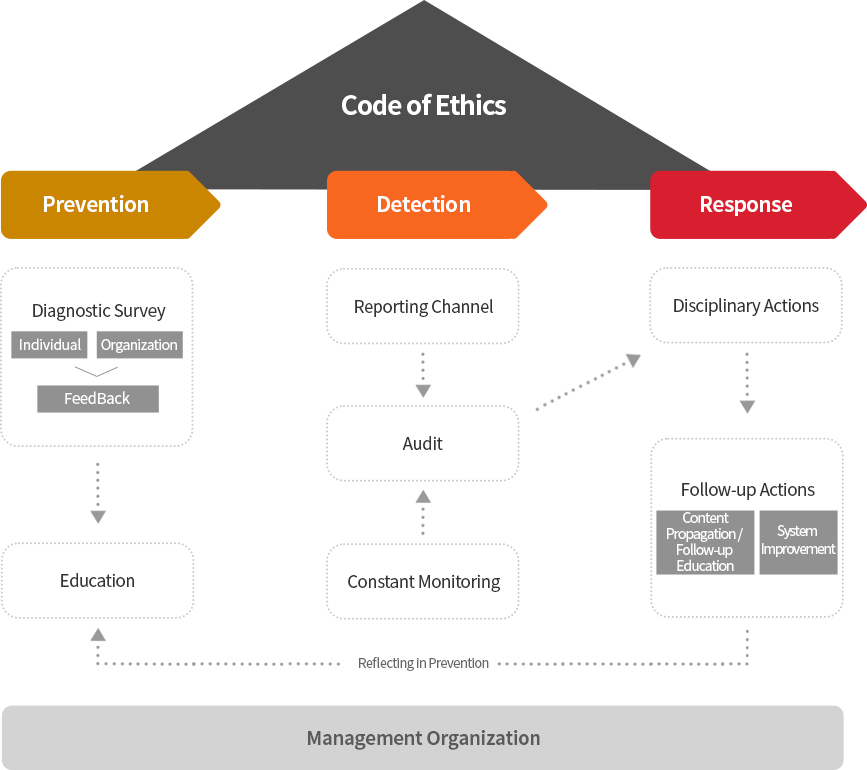
-
예방
진단서베이 (개인, 조직) → FeedBack → 교육
-
식별
제보채널 → 감사 ← 상시모니터링
-
대응
감사 → 징계 → 후속 조치 (내용전파 / 후속교육, 시스템 개선) → 예방에 반영 → 교육
관리조직
In 2023, SK ecoplant materials, introduced the Anti-corruption Management System (ISO 37001) with the objective of achieving “Zero Anti-corruption Risk.” Based on this, we intend to progressively improve the ethical management system.
- Expanded application of the self-cleaning system to subsidiaries
-
Certification of anti-corruption management system
(ISO 37001) - Establishing a systematic anti-corruption operation process
Ethical Management Structure
[Highest Decision-making Body]
Under the supervision of the Board of Directors, the Audit Committee comprehensively manages and supervises the company's
ethical management and anti-corruption risks.
The Audit Committee is composed wholly of outside directors and is responsible for ensuring that the management is effectively
engaging in ethical management and managing anti-corruption risks on independent and objective perspectives. The Audit
Committee has established an internal audit department to oversee and handle the practical operations.
The Audit Committee has the authority to appoint/dismiss and approve the appointment/dismissal of the head of the internal audit
organization. Additionally, the committee is responsible for reviewing the company's ethical management and anti-corruption policy
on an annual basis, as well as reviewing and approving internal audit implementation plans, including risk prevention, detection,
and response activities. Furthermore, the company's financial and non-financial risk management, as well as the operation of
internal controls and the evaluation results of the operations, are reported to the Audit Committee.
[Internal Audit Department]
As the internal audit department, the Autonomous Responsible Management Support Team is responsible for the practice of the
company's ethical management and anti-corruption risk management.
In 2024, the organization was reformed from directly under the CEO to directly under the Audit Committee in order to support the
role of the Audit Committee and further enhance the independence and objectivity of work performance. The team reports major
activities regarding ethical management and anti-corruption risks, risk management, and internal control inspection to the Audit
Committee, and receives feedback.
Under the SK Group's distinctive ethical management system, the team is effectively practicing anti-corruption risk prevention,
detection, response, and improvement activities, as well as conducting objective inspections of all business activities of SK ecoplant Materials’
subsidiaries and members, thereby regularly reporting significant issues to the Audit Committee and CEO and recommending
timely improvements.
Implementation Elements Of Ethical Management
SK ecoplant materials. recognizes ethical management as a critical prerequisite for corporate sustainable management. We are striving to create a fair and transparent corporate culture and practice ethical management by establishing the following ethical management 3C (Code, Compliance, and Consensus) system.
-
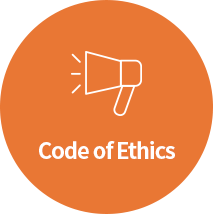
- Practice Rules of Ethics Code
- Violations cases by main themes (Don’ts)
- Ethical management practice FAQ for SK leaders
- Ethical management practice pledge
- Prohibition of holiday gift acceptance
-
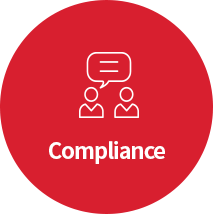
- Operation of an organization / system dedicated to ethical management
- Operation of the Integrated Group Reporting Site and information protection
- Operation of the Ethics Complaints Counselling Center (Happiness Empathy)
- Operation of the self-cleaning system
-
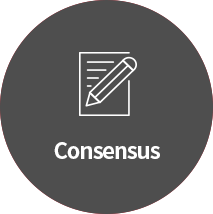
- Development and implementation of ethical management education program
- Ethical management practice letter
- Operation of communication and participation program for members
- Conduct a survey for diagnosis of ethical management level
- Ethical management practice workshop
Code of Ethics
SK ecoplant materials. focuses on establishing ethical management as a corporate culture by having all members (including contract workers and dispatched workers), who work at the headquarters, overseas subsidiaries, and affiliated companies, equipped with ethical thinking and practice it. To this end, we have established practice rules of ethics code by each company and taken them as a criterion for decision-making and right behavior in all management activities.

Principles of Ethical Decision-Making and Conduct
Legitimacy / Transparency / Rationality

Attitude of Members
Performing Duties with Integrity / Prohibition of Conflicts of Interest / Protection of Company’s Assets / Prohibition of Offer or Receipt of Gifts and Hospitality / Mutual Respect among members

Compliance with Laws, Regulations, and Business Policies
Quality / Management Information / Fair Trade and Competition / Safety, Health, Environment

Execution of Guidelines
Department in Charge / Informant Protection
Anti-corruption Regulation
SK ecoplant materials has established the "compliance regulations of Anti-Corruption Act" and taken them as a criterion for decision-making and behavior, to pursue the continuous happiness of all of its members (including contract workers and dispatch workers) working in the headquarters, overseas branch, and affiliated subsidiaries and all stakeholders, and to realize social values through ESG management.
Anti-corruption Policy
Code of Conduct for Members
-
One,
I keep in mind that I must stick to safety for the safety, health, and environmental protection of myself, the company, and furthermore mankind, and make every effort to prevent accidents by complying with the company's safety rules and working procedures.
-
One,
Recognizing that the transparency of the company begins with my actions, I take the lead in ethical management through the distinction between public and private affairs.
-
One,
In order to make stable profits and secure new growth engines for the company, I focus my best capabilities on cost reduction, quality improvement, and technological innovation.
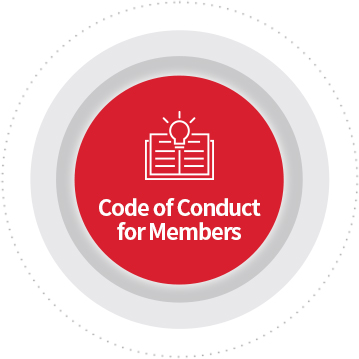
-
One,
I create an organization culture of mutual respect, cooperation, and trust through better communication.
-
One,
I provide the best value to customers and shareholders under the highest quality and service principles.
-
One,
I cope with the changing environment through future-oriented creative thinking and continuous self-development, and strengthen the internal capabilities necessary to overcome the crisis.
-
One,
I devote myself to working with creativity and passion to make sure to create a good company for all members to work for and want to work for.
Code of Ethics for Manufacturing
SK ecoplant materials is taking precautions for ethical risks by separately enacting the 'Code of Ethics for Manufacturing Regulations' that identifies topics related to ethical management in the production/manufacturing and research/development/investment process due to the nature of the industry.
Ethical Practice Terms and Conditions for Partner Companies
SK ecoplant materials. delivers the ethical practice terms and conditions to all of its partner companies conducting business with SK ecoplant materials. and its affiliates, and recommends them to comply with ethical management principles.
Ethical Management Education for Members and Partner Companies

Members
SK ecoplant materials. conducts ethical management and anti-corruption training every year for all members (including contract and dispatched workers) working in the headquarters, overseas branch, and affiliated subsidiaries to raise the members’ ethical awareness while sharing enactments and revisions of laws and regulations related to major issues. In addition, specialized education on ethical management practices is provided for the CEO, management, and the board of directors. Specialized courses are also operated for specific corporations, departments, and positions. To improve the awareness level of ethical management among overseas members, the practice rules of ethics code, counseling, and reporting procedures are provided in the local language for each overseas business site, and ethics training contents specialized for foreign members are translated into the local language for each overseas business site.

Partner Companies
SK ecoplant materials. provides anti-corruption education not only for its members but also for its 28 shared-growth partners every year to enhance their ESG and plans to expand ethical management and anti-corruption education to more partners of SK ecoplant materials. and affiliates.
Ethical Awareness Promoting Activities

SK ecoplant materials. is operating communication channels such as ethics counseling and ethical management site to strengthen ethical management status monitoring and supervision. The Code of Ethics is made public and we receive counseling and reports for unethical behavior through these channels. In addition, a separate page is operated on the company intranet to facilitate communication with internal members. Ethical management issues that may arise are shared with members. Furthermore, we are carrying out a variety of activities to motivate members to practice ethical management through a campaign not to give and receive gifts on holidays, providing the letter of ethical management guide, an ethical management quiz event, and information on reporting procedures.
Self-sustaining purification system

To enhance the level of autonomous ethical management, SK ecoplant materials. conducts internal inspections of ethical risks by each field through a checklist at least once a year. The checklist has been made to inspect and assess risks reflecting the characteristics of operations, including HR management, cost management, purchase/business partner management, sales/receivables management, investment management system, inventory management, and management of peculiar risks.
Ethical Management Practice Survey

Each year, SK ecoplant materials. conducts an ethical management practice survey targeting all members of SK ecoplant materials. and the whole subsidiaries to check the compliance with the company’s Code of Ethics and ethical culture level. The key implications derived from the ethical management surveys which include mutual ethical behaviors among members, elements of impeding SV, and continuous improvement of the ethical management practice system shall be reflected in the ethical management activities in the next year. We are supporting ethical management infrastructures such as providing customized ethical management content and material to key business sites and organizations where it is deemed that ethical management risk is growing.
Ethical Management Practice Pledge

Members and business partners promise to implement ethical management through the pledge of ethical practice. In addition, all members and business partners write a pledge of ethical practice each year through the online system, to voluntarily reflect the meaning of the Code of Ethics and review the ethical standard.
Ethical Management Practice Workshop

SK ecoplant materials. holds an ethical management practice workshop for all members of the entire SK ecoplant materials. affiliates every year, to support members in making the right choices in the ethical dilemma situations they may face in the organization. After watching videos related to the topics, members actively discuss ethical risk cases and major issues such as “lack of personality respect” and “false reporting”, share ideas on improving the ethical management practice, and form consensus on the direction to improve the organizational culture.
Operation of System for Reporting Bribery

Accepting bribery from stakeholders is prohibited regardless of any reason whatsoever. And in case that money, gifts, and other things have been accepted inevitably, they have to be reported to the Ethical Management Organization according to the procedure, then returned to the stakeholder. In case it is disrespectful or impossible to return the items, they will be donated to a social welfare facility and it shall be notified to the stakeholder with a letter to prevent any recurrence.
Ethical Management Reporting
SK ecoplant materials. operates an ethical management reporting system so that not only members but also all stakeholders can report unethical behavior. Report is received and processed behind closed doors, and the identity and content of the informant are thoroughly protected in accordance with the informant protection regulations.
Report Processing Procedures
Receiving the report

Identifying the contents

Initiating the investigation

Wrapping up the investigation

Closing the case

Processing result

How to Write a Report
Please describe the case in as much detail as possible according to the principle of 5 W's and 1 H.
- Please fill in the personal information of the subject using real name if possible.
- Please provide detailed description of when, where, and what kind of the problem occurred.
-
Documentary evidence such as photographs, documents, etc. would be of great help in the investigation of the
violation.
(In the case where the evidence is insufficient despite the obvious violation, specify the channel of obtaining information and the details, place, and confirmation method of the violation to verify the facts) - Investigation will begin after receiving the report, feedback on the progress of each step will be provided to the informant until the investigation is closed, and the results of the processing can be checked on the "Report Processing Results" page or via the reply method (e-mail or phone) selected by the informant.
-
Detailed guide on reporting procedures
-
Ethics Counseling and Report Handling Procedures1. General Matters of Ethics Counseling & Report Handling
1.1 Solution to inquiries regarding ethics
- 1)If executives and staff members have any questions about the interpretation or application of the Code of Ethics, Practice Guideline or FAQ, they shall ask them to the leader of the organization or the department in charge of ethical management or have counseling and follow their interpretation.
- 2)The leader of the organization shall resolve the matters asked by the executives and staff members under his/her control according to the standards and policies of the Company. If it is difficult to resolve the matters by himself/herself, the leader shall handle them through consultation with the department in charge of ethical management.
- 3)The department in charge of ethical management shall conduct counseling according to the procedures of “Ethics Counseling.”
1.2 Reporting and handling of violations
- 1)An executive or a staff member who noticed violations of the Code of Ethics, Practice Guideline or FAQ shall report the case to the leader of the organization or the department in charge of ethical management.
- 2)If the leader of the organization receives a report about violations, he/she shall resolve it according to the standards and policies of the Company or through consultation with the department in charge of ethical management. If the leader of the organization has solved the matter personally, it is necessary to inform the department in charge of ethical management of the result of the measures.
- 3)The department in charge of ethical management shall handle a reported matter according to the procedures of “Report Handling.”
1.3 Installation and operation of ethics counseling & reporting channel
- 1)The department in charge of ethical management shall operate the counseling & reporting channel to facilitate easy counseling and reporting of ethical management for interested parties and systematic handling of the matters.
-
2)Counseling and reporting can be done through the following channels and all channels are available 24/7.
- Online at: Integrated online report channel of SK Group (the Group), available 24/7
- E-mail: skmr-ethics@sk.com, available 24/7
- Mail: Person in charge of ethical management of Audit Room, available 24/7 SK Materials Co., Ltd. 22F, Granseoul Tower 1, 33 Jong-ro, Jongno-gu, Seoul, 03159, Republic of Korea
2. Ethics Counseling2.1 Processing the applications for counseling
-
1)Ethics counseling shall be offered for the following inquiries.
- The Company’s standards and policies for ethical management
- Interpretation of the Code of Ethics, Practice Guideline and FAQ
- General knowledge regarding ethical management, etc.
2.2 Counseling
- 1)The department in charge of ethical management shall provide appropriate and consistent interpretation and guidelines for the matters of counseling according to the Code of Ethics, Practice Guideline, FAQ and the ethical management policies of the Company.
- 2)When consultation from relevant departments are needed or when there is no established policy of the Company on the matters of counseling, it is required to establish policies of the Company through consultation with the related departments and provide counseling accordingly.
2.3 Notification and follow-up management
- 1)The result of ethics counseling shall be notified to the counselee in an appropriate manner.
- 2)The department in charge of ethical management is required to prevent disclosure of the identification of the counselee or the contents of counseling against the will of the counselee.
- 3)The contents of counseling shall be maintained and managed using a separate form.
3. Report Handling3.1 Acceptance of report
-
1)Reporting means providing information about violations of Code of Ethics, Practice Guideline or FAQ by executive or a staff member.
- Dereliction of duty, Conflict of interest, Inappropriate usage of the Company’s assets and information, Improper offer or receipt of gifts/hospitability/etc., Violation of mutual respect between the members of the Company (discrimination, sexual harassment, verbal abuse, etc.), Distortion of management information, Violation of Fair trade and competition, Violation of policies on safety/health/environment, Violation of anti-corruption, Violation of protecting personal information, and Violation of the Company’s other policies and working principle etc.
-
2)For fact check, the department in charge of ethical management shall receive the report based on the principle of 5W1H and secure related evidentiary materials as many as possible.
- Personal information of the Informant (including whistle-blower): Name, department, telephone number, etc.
- Contents of report :
- Identify details based on the principle of 5W1H
- Evidentiary materials, etc. that can support the contents of the report
- 3)In case a report is received through channel other than the integrated online report channel of the Group, such as e-mail and mail, it shall be registered in the integrated online report channel of the Group.
3.2 Fact verification
- 1)In principle, fact verification of a report shall be conducted only for the report submitted under the Informant (including whistle-blower)’s real name. However, fact verification of an anonymous report can also be allowed depending on circumstances in consideration of the character and materiality of the report.
- 2)e department in charge of ethical management shall conduct fact verification of the report.
3.3 Taking measures against violations
- 1)If violations are confirmed to be true upon the investigation results, measures shall be taken against the violators (executives, staff members or suppliers) under relevant Company regulations.
- 2)If it is confirmed that the report has been made for solely personal purposes including libel, slander and falsehood, appropriate measures shall be taken against the involved Informant (including whistle-blower) according to relevant Company regulations.
- 3)If no violation is found, the case shall be concluded by the department in charge of ethical management.
3.4 Reporting and follow-up actions
- 1)If any disciplinary measures are needed, the case shall be reported to the person who has the right of approval for the matter.
- 2)The result of the measure shall be notified to the Informant (including whistle-blower) in an appropriate manner.
- 3)The result of the measure shall be concluded after registering it in the integrated online report channel of the Group.
4. Informant (including whistle-blower) Protection Policy4.1 Protection policies
-
1)An Informant (including whistle-blower) should not suffer from retaliatory action in any form by other executives or department to which he/she belongs for having reported a possible violation or submitting related statements or materials.
- ①If an Informant (including whistle-blower) has received disadvantageous measures due to the report, he/she can request the department in charge of ethical management to rectify the disadvantages and take protective measures including transfer to another department.
- ②If there is a request for corrective action and protection from an Informant (including whistle-blower), the department in charge of ethical management shall take measures to minimize the disadvantages of the Informant (including whistle-blower) and establish and implement measures to prevent recurrence of such an incident including sanctions against the person involved.
- 2)It is required to keep the identity of the Informant (including whistle-blower) and the contents of the report confidential to prevent them from being revealed against the Informant (including whistle-blower)’s will.
- 3)A person who cooperates with the investigation by submitting statements or materials during the process of fact verification of the report shall be protected in the same way as that of the Informant (including whistle-blower).
- 4)A report made for solely personal purposes including libel, slander and falsehood shall not be protected.
4.2 Sanctions and reduction/exemption
-
1)If a person violates the “Informant (including whistle-blower) Protection Policy,” measures shall be taken according to the Regulation.
- A retaliatory action giving disadvantages to the Informant (including whistle-blower) who has reported possible violation
- Disclosure of identity of the Informant (including whistle-blower) or the contents of the report obtained officially or accidently
- Tracking down the Informant (including whistle-blower) or instructing to track down the Informant (including whistle-blower)
- 2)If a person who was involved in an action violating the Code of Ethics, Practice Guideline or FAQ or an illegal action reports the action voluntarily, sanctions against such an action can be reduced or exempted.
-
Subject to Report

Anti-corruption and exercising power trip on business partners (BP)
(Acceptance of money / hospitality, personal requests, equity investment, unfair instructions, verbal/physical abuse, etc.)

Lack of respect for colleague(s)
(Verbal / physical abuse, sexual harassment, ostracizing, unfair exclusion from business responsibilities, demand for personal errands, etc.)

Conflict of interests in business relationships
(Side job, excessive care of personal errands on the job, monetary transactions between colleagues, investment using inside information, transactions with specially related parties, etc.)

Unfair business decisions
(False reporting, performance data rigging, unlawful marketing practice, illegal use of company funds or assets, unauthorized disclosure of corporate information, etc.)

Damage to social values
(Non-compliance with environment / safety / health / quality regulations, disregard of socially disadvantaged groups, unauthorized disclosure of customer data, disclosure of false information to customers)
Cases where the investigation is difficult
- In the case where there is no specific factual relationship or where it falls under speculation or vague suspicion
- In the case where it is impossible to confirm the fact without the informant's additional cooperation because the contents are not clear
- In the case of simple complaints and inconveniences, such as reporting unkind acts, expressing displeasure, and unilateral complaints filing
- In the case of the request for a role beyond the legal authority of the company (BP's overdue wages, non-payment of payment by subcontractors, etc.)
- In the case where what you intend to report is pending in the court
Informant Protection Regulations
We operate an informant protection program so that informants can report with reassurance that there is not any disadvantage.
- 1. You will not be disadvantaged or discriminated against for the reason of the legitimate report.
- 2. In case of receiving disadvantage due to reporting, you can submit a request for correction and protection to the ethics management department, and the ethics management department will take all measures to minimize the disadvantage.
- 3. The identity and information of informants are kept strictly confidential so that they are not disclosed against their will.
- 4. We will equally protect those who have cooperated with the investigation by making statements or providing data during the fact-checking process of the report.
- 5. In the event of participating in an unethical or illegal act but voluntarily reporting the fact, your sanctions on the act can be reduced or exempted.
Internal Audit
SK ecoplant materials’s Ethical Management Team aims to provide independent and objective audits that can add value to the company and improve the company’s operations. All management activities of SK ecoplant materials’s as a whole, including affiliated businesses, functions, and overseas subsidiaries which could be potentially subject to audit are managed as an audit population. The population list is annually updated with the change in the business environment. The annual audit plan is established through risk assessment in consideration of various factors such as audit resources and cycle, and then finalized through Audit Committee’s approval. The regular audits are conducted every year based on the finalized annual audit plan to evaluate the efficiency, effectiveness, and adequacy of internal control of the company's business activities, in order to derive recommendations and action plans established by organizations aiming for continuous improvement and mitigation of risks. We have a systematic audit process with guaranteed independence and effectiveness.
In addition, we are receiving reports from various stakeholders such as members and business partners via on-line, e-mail, and telephone reporting channels. Subsequently, we conduct fact verification to determine whether there is a violation of ethical standards. The planned audit and investigation results are regularly reported to the Audit Committee, and follow-up audits are conducted annually to track the implementation of audit recommendations. The company actively supports participation in various trainings and acquisition of professional certifications in order to continuously strengthen the capacity of the internal audit organization.